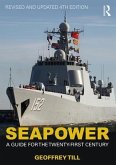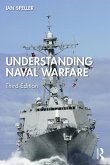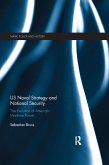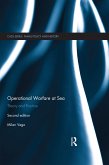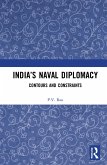This updated new edition of Understanding Naval Warfare offers the reader an accessible introduction to the study of modern naval warfare, providing a thorough grounding in the vocabulary, concepts, issues and debates, set within the context of relevant history.
The third edition explains traditional concepts and explores current and emerging ideas concerning the theory and practice of naval warfare, relating these to recent events including Sino-American naval competition and the Russian-Ukraine War. Navies operate in an environment that most people do not understand and that many avoid. They are equipped with a bewildering range of ships, craft and other vessels and types of equipment, the purpose of which is often unclear. Writings on naval warfare are usually replete with references to esoteric concepts explained in specialist language that can serve as a barrier to understanding. This book cuts through the obscure and the arcane to offer a clear, coherent and accessible guide to the key features of naval warfare which will equip the reader with the knowledge and understanding necessary for a sophisticated engagement with the subject. The new edition is divided into two key parts. The first focuses on concepts of naval warfare and introduces readers to the ideas associated with the theory and practice of naval operations and includes a chapter where the history of the last century of naval warfare is explored in order to illustrate the key concepts. The second part focuses on the conduct of war at sea and on peacetime roles for contemporary navies and now includes new material on hybrid warfare and grey zone operations and on joint warfare, multi-domain operations and integrated deterrence within the context of evolving great power rivalry at sea.
This textbook will be essential reading for students of naval warfare, sea power and maritime security and is highly recommended for those studying military history, strategic studies andsecurity studies in general.
The third edition explains traditional concepts and explores current and emerging ideas concerning the theory and practice of naval warfare, relating these to recent events including Sino-American naval competition and the Russian-Ukraine War. Navies operate in an environment that most people do not understand and that many avoid. They are equipped with a bewildering range of ships, craft and other vessels and types of equipment, the purpose of which is often unclear. Writings on naval warfare are usually replete with references to esoteric concepts explained in specialist language that can serve as a barrier to understanding. This book cuts through the obscure and the arcane to offer a clear, coherent and accessible guide to the key features of naval warfare which will equip the reader with the knowledge and understanding necessary for a sophisticated engagement with the subject. The new edition is divided into two key parts. The first focuses on concepts of naval warfare and introduces readers to the ideas associated with the theory and practice of naval operations and includes a chapter where the history of the last century of naval warfare is explored in order to illustrate the key concepts. The second part focuses on the conduct of war at sea and on peacetime roles for contemporary navies and now includes new material on hybrid warfare and grey zone operations and on joint warfare, multi-domain operations and integrated deterrence within the context of evolving great power rivalry at sea.
This textbook will be essential reading for students of naval warfare, sea power and maritime security and is highly recommended for those studying military history, strategic studies andsecurity studies in general.
'The new edition of Understanding Naval Warfare, the standard guide to the use of force at sea for practitioners, analysts and academics across the world, is timely, updating the skilled exposition and striking insight for a new era of Superpower competition at sea. The People's Republic of China has become a major actor on the global ocean, combining rapid naval expansion with economic power, a massive shipbuilding industry, controversial extractive industries and aggressive economic policies. The United States and its allies were in the process of responding to Chinese expansion, notably with the AUKUS deal, when the Russian invasion of the Ukraine in 2022 emphasised the synergy of land, sea, air, economic and cyber operations, and the critical role of the oceans in resource flows, information transmission, and strategy. The resulting spike in energy costs and the supply of basic foodstuffs has reminded everyone just how vulnerable the modern world has become to conflict, the loss of sea control or, in the case of the MV Evergiven, a single maritime accident. Naval warfare has never been more important, this timely new edition will equip practitioners and policy-makers to meet an era of naval competition between Superpowers.'
Professor Andrew Lambert, Laughton Professor of Naval History at King's College London
'Recent events in the Euro-Atlantic and Indo-Pacific theatres show that seapower is crucially important to our futures and that Maritime Strategy is an extremely fast moving field of concern. Sailors and those interested in their ways struggle to keep up. This admirable book will help them do so and is highly recommended.'
Geoffrey Till, Author of Seapower: A Guide for the 21st Century
Praise for the first edition:
'In order to understand the concept of naval warfare there are two things that are required: to be able to define what navies do for a state and their utility for operations during total war, limited war and peace. Understanding Naval Warfare does both things very well and is a wonderfully informative and readable introduction into the complex world of naval warfare. Packed with useful definitions, explanations, examples, theoretical understanding and technical knowledge, the book is well worth the money for anyone wishing to embark on the study of naval power and its uses.'
Greg Kennedy, Kings College London and UK Defence Academy
'Ian Speller has written what is likely to become a classic in the field. Understanding Naval Warfare lives up to the promise of its title and delivers a beautifully written explanation of concepts and relevant real-world examples. This is a comprehensive examination of the conduct of naval warfare ... the work will help naval officers from Admiral to Ensign sharpen their ideas and expand the knowledge of their profession. By making obscure concepts accessible it will also be a boon to civilian policy makers and students of naval warfare. Finally, this book has the virtue of being a terrific read.'
Rear Admiral Mike McDevitt, USN (retd.), Senior Fellow, CNA Center for Naval Analyses
'This is a clear and well-written account of naval warfare ... It should work well as a teaching tool as well as a guide to discussion in the scholarly community. ... An impressive book.'
Jeremy Black, The Mariner's Mirror
Professor Andrew Lambert, Laughton Professor of Naval History at King's College London
'Recent events in the Euro-Atlantic and Indo-Pacific theatres show that seapower is crucially important to our futures and that Maritime Strategy is an extremely fast moving field of concern. Sailors and those interested in their ways struggle to keep up. This admirable book will help them do so and is highly recommended.'
Geoffrey Till, Author of Seapower: A Guide for the 21st Century
Praise for the first edition:
'In order to understand the concept of naval warfare there are two things that are required: to be able to define what navies do for a state and their utility for operations during total war, limited war and peace. Understanding Naval Warfare does both things very well and is a wonderfully informative and readable introduction into the complex world of naval warfare. Packed with useful definitions, explanations, examples, theoretical understanding and technical knowledge, the book is well worth the money for anyone wishing to embark on the study of naval power and its uses.'
Greg Kennedy, Kings College London and UK Defence Academy
'Ian Speller has written what is likely to become a classic in the field. Understanding Naval Warfare lives up to the promise of its title and delivers a beautifully written explanation of concepts and relevant real-world examples. This is a comprehensive examination of the conduct of naval warfare ... the work will help naval officers from Admiral to Ensign sharpen their ideas and expand the knowledge of their profession. By making obscure concepts accessible it will also be a boon to civilian policy makers and students of naval warfare. Finally, this book has the virtue of being a terrific read.'
Rear Admiral Mike McDevitt, USN (retd.), Senior Fellow, CNA Center for Naval Analyses
'This is a clear and well-written account of naval warfare ... It should work well as a teaching tool as well as a guide to discussion in the scholarly community. ... An impressive book.'
Jeremy Black, The Mariner's Mirror


